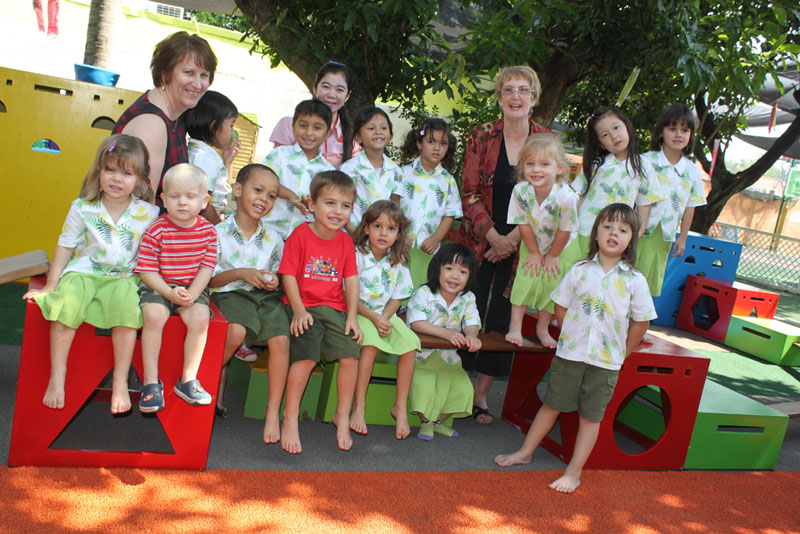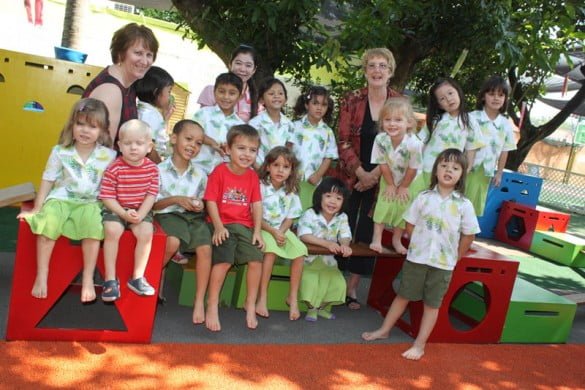Meet Raewyn Ashby. The school principal from New Zealand who strives for her students to become confident, connected and actively involved lifelong learners.
How long have you been living in Indonesia and how long have you held the position of principal?
I have lived in Indonesia for seven years and have held the position of Principal at the New Zealand International School since January 2011. Previously I was the Head of Primary at NZIS from 2005. The difference now is that I am responsible for both the Primary and Secondary Campus and also the overall management of all the departments in the school.
What is the most difficult part of being a principal?
There are difficulties in every job but as educators we are all about solving problems. This stems from a genuine concern for others and always striving to work alongside our school family to improve, whether it is with students, parents/caregivers or staff. Embracing and understanding that we are working and living in a new and different environment than our home experience is something we continually need to focus on and give support to each other.
What would you say is the most essential quality in being a good teacher?
A good teacher has a genuine empathy with their students. They are role-models to ensure self-confidence and pride in achievements and one who creates a learning environment that is positive, with clear boundaries and behavioural expectations. To be inclusive in their practice, therefore, treating all students as individuals and creating respect, value and appreciation of others. A good teacher develops a partnership between student, parents/caregivers and teachers, which is essential for a successful educational journey. It is important for a teacher to have on-going professional development, to reflect on their own teaching practices and to be open to change.
When did the New Zealand International School open, and in what ways has it changed or evolved since then?
The school opened in 2002 and we are celebrating our 10th Anniversary this year. The school has changed considerably during this time with significant change in student numbers from 13 to current numbers of 329. One of the biggest changes has been in our Early Childhood area. When I started at the school we had seven students and now we have expanded to four classes with 66 students. Staff numbers have also increased which has allowed us to expand on the choices for students, in particular at the Secondary Campus. We became involved with a local university, Universitas Sultan Ageng Tirtayasa, to offer one year internships in 2010 to their graduating students. This involves a transfer of knowledge by our teachers with 12 graduates participating this year. They work alongside the classroom teacher to learn about current teaching practices and on leaving NZIS they will then be able to share that knowledge with local schools.
Speaking of local schools, what are your thoughts on the local education system in Indonesia?
I have been part of several discussions regarding education in Indonesia. There is a desire for change while ensuring that the culture, beliefs and language are retained. International schools here can and should play a part in sharing our knowledge not just within our own setting but offering out to the wider community. For example Internship programmes and links with local schools. Teaching training programmes on a wider scale are paramount for change to happen.
Does the school promote environmental awareness, if so, in what ways?
We do our best in terms of recycling and environmental awareness across the school and it is included as a topic within our curriculum. We often ask our parents to save and send to school items for recycling into art and project work. This year we are also running a Wearable Arts competition where students have to utilise recycled products to create a garment.
How mixed is the student population – how many different nationalities are currently studying at the school?
We currently have 34 nationalities represented at the school. It is incredible how it is simply part of our students’ lives to be working alongside such a variety of people where language, beliefs and culture are diverse but also embraced.
And in what ways do you teach or celebrate New Zealand culture in the school?
The school has had a Kapa Haka performance group virtually from the beginning, which has become a very unique part of the school. It encompasses traditional Maori action songs and hakas and includes both girls and boys. The group has been fortunate to perform in front of a variety of audiences including NZ Prime Minister Rt. Hon John Key, Hon. Mrs Anne Tolley a former New Zealand Minister of Education, H.E. Mr David Taylor our NZ Ambassador in Jakarta, ANZAC Day and for ANZA to name a few. Throughout our classrooms you will also see aspects of our NZ and Maori language, artwork and topics.
Could you share with us what your own school experience was like?
I had a great school experience growing up in a small town in New Zealand. The schools I attended were very much like our school here in Jakarta where individual attention to each and every one of the students was achieved. The friendships that developed from living in a small community as we went from Kindergarten until the end of our Secondary level made a significant difference to our lives. I think the major difference today is that academic achievement has a stronger focus where in my day you could follow a more vocational path with apprentice opportunities very common. Sporting played a significant part in most of our lives with a large range offered. Weekend competitions and after school practices kept us very busy and developed teamwork and fitness.
And what was your favourite subject in school?
My favourite subject was Commercial Studies, which was a mix of learning shorthand, typing and office skills. In the most part because of the teacher, who was inspiring and supportive.
Was there any one teacher that influenced your life, or your approach to education?
I was fortunate to have many teachers that have shaped the way I think and value the importance of education. The most significant were a Secondary teacher, my mentor teacher while training to become a teacher and a lecturer at University. They not only shared their knowledge with me but also supported and made me believe in myself and my capabilities. I will be forever grateful for them and have been able to share that with them over time.
To get in touch with Raewyn email her at [email protected]





